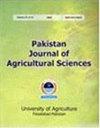农民对自然灾害的认识及其对粮食生产力的影响——来自巴基斯坦旁遮普邦水稻-小麦种植区的证据
IF 0.6
4区 农林科学
Q3 AGRICULTURE, MULTIDISCIPLINARY
引用次数: 1
摘要
在全球范围内,气候脆弱性和自然灾害对作物生产力和粮食安全产生不利影响。巴基斯坦主要作物的产量受到自然对手的严重影响,这是贫困的根源。据预测,由于这些危险,在不久的将来,巴基斯坦可能会出现粮食不安全问题。由于气候和自然灾害,农业生产力的下降通过乘数效应影响到农业社区、制造业和商业部门。该研究设计于2020年,旨在评估巴基斯坦旁遮普邦水稻-小麦种植区农民对自然灾害对粮食作物生产影响的看法。使用多阶段随机抽样技术(MRST)从540名农民中收集数据。该研究根据农民感知的Likert量表的平均得分对自然灾害进行了排名。粮食生产容易受到洪水、虫害、生物疾病、酷热、夏季风暴、冰雹和热浪的影响。然而,湿度对粮食生产产生了积极影响。因此,应该制定适当的政策来减轻自然灾害对水稻-小麦生产的不利影响,通过增加粮食产量(可用性)和收入(可获得性)来确保粮食安全。本文章由计算机程序翻译,如有差异,请以英文原文为准。
Farmers’ Perception Regarding Natural Hazards and Impact on Food Productivity: Evidence from Rice-Wheat Cropping Zone of Punjab, Pakistan
Globally, climatic vulnerabilities and natural hazards adversely affect crop productivity and food security. The yield of major crops in Pakistan is badly affected by natural adversaries, which is a source of poverty. It is predicted that the near future food insecurity issue can prevail in Pakistan due to these hazards. Due to climatic and natural hazards, a decline in agricultural productivity affects the farming community, manufacturing, and business sectors through a multiplier effect. The study was designed during 2020 to assess the farmers’ perceptions regarding the impact of natural hazards on food crop production in the Rice-Wheat cropping zone of Punjab, Pakistan. Data were collected from 540 farmers using Multistage Random Sampling Technique (MRST). The study ranked natural hazards based on the mean score of the Likert Scale of farmers’ perceptions. Food productivity was adversely prone to flood, insect infestation, biological diseases, extreme heat, wind storms in summer, hailstorms, and heatwaves. However, there was a positive impact of humidity on food production. So, appropriate policies should be formulated to mitigate the antagonistic impact of natural hazards on rice-wheat production, ensuring food security via increasing food production (availability) and income (accessibility).
求助全文
通过发布文献求助,成功后即可免费获取论文全文。
去求助
来源期刊

Pakistan Journal of Agricultural Sciences
AGRICULTURE, MULTIDISCIPLINARY-
CiteScore
1.80
自引率
25.00%
发文量
18
审稿时长
6-12 weeks
期刊介绍:
Pakistan Journal of Agricultural Sciences is published in English four times a year. The journal publishes original articles on all aspects of agriculture and allied fields.
 求助内容:
求助内容: 应助结果提醒方式:
应助结果提醒方式:


